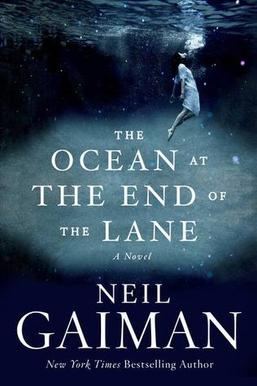When I started reading 'The Ocean at the End of the Lane', it was in bits in the evenings before bed, a little at a time, with the iPad deliberately put aside for the night.
Then the storm struck, and the weather reports leading up to it billed it as just another squall in a pattern that's been going for weeks. That Thursday evening the thunder started, then rain, then there were flashes that at first I took for police lights. A moment later, the house went dark.
Both my boss and I showed up at work early the next morning, to find that the clinic did in fact have power. Neither of us was expecting that, since our own homes were dark. It turns out that a small diamond-shaped area centered on the nearby intersection had electricity and, surprisingly, the internet worked just fine so that I could look up a power outage map to see it. The surrounding neighborhoods were mostly out, for large enough swathes that they didn't even want to estimate when the power would be restored. The entire weekend was quiet, the only sounds in the area birdsong and generators. Even going out for errands was an adventure of roads blocked by fallen trees, and hoping that we'd find businesses the were open and had lights.
I got a lot of reading done, and something about the strange atmosphere of the neighborhood contributed to the mood of the book I was falling into every spare moment.
Much of the book is a dreamy reverie, as the main character recalls the boy that he once was, and an unearthly adventure that he can't believe he forgot. With the guidance of a girl named Lettie (and the maiden/mother/crone she's a part of), he suffers the consequences of a blurring of lines between our world and another place.
The one thing that occasionally falls flat for me with Neil Gaiman is a certain emotional detachment his main characters seem to have from the bizarre twists and turns of the plots their lives entangle with. This book portrays the boy at its heart as quietly distraught, keeping a facade of detachment but privately seething. It was a depiction that resonated well, and while this is not a long book it packs a lot of imagery and tension into something that's deceptively small in your hands.
Sometimes Neil Gaiman describes things that defy visual portrayal, more intense in feelings that would never translate to illustration, but I could vividly picture every scene, and for somebody who is a visual thinker that may have made the book all the better for me. The descriptions of surreal scenes give just enough and not too much, and this is one book I'd be curious to see a movie version of.
At the beginning and end is a framework of the narrator as an adult, recalling all this with wonder, and while there's an important plot point that ties in with that it still feels less important than all that happens within that memory.
This book has been out for a while, and I feel mildly annoyed with myself for not getting hold of a copy sooner, but on the other hand the timing with the power outage gave me an entire weekend where I felt lost in a wild dreamlike state.
We got our electricity back Sunday evening, and I'm just a little bit sorry.
